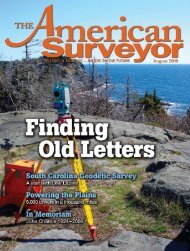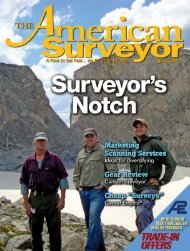Interview With Javad Ashjaee - The American Surveyor
Interview With Javad Ashjaee - The American Surveyor
Interview With Javad Ashjaee - The American Surveyor
You also want an ePaper? Increase the reach of your titles
YUMPU automatically turns print PDFs into web optimized ePapers that Google loves.
FEATURE<br />
spent his first Christmas holiday break alone, and ruefully recalls<br />
thinking that the only ones left in town were foreigners and stray<br />
dogs. He also remembers the time one of his professors referred<br />
to an electronic circuit as a “super-duper” filter. Although he had<br />
no idea what the term “duper” meant, he assumed it must be significant,<br />
and feared being deported if his professor found out<br />
that he had no knowledge of “Duper Filters.” It took the assistance<br />
of a PhD from India to educate him in the field of slang<br />
terms. Before he left Iowa City, the industrious “newcomer” had<br />
received masters degrees in both math and electrical engineering<br />
(EE), as well as a PhD in EE.<br />
Political Views Questioned<br />
<strong>Javad</strong> returned to Teheran to teach in 1976, and became chairman<br />
of the Department of Computer Engineering at the Aryamehr<br />
University of Technology where he founded and managed a UNI-<br />
VAC-100 computer center. <strong>The</strong>re, he created the first Iranian<br />
microprocessor lab. In 1978 he created one of the earliest student<br />
online and interactive registration systems in the world.<br />
It is during this time that President Carter was in office and<br />
political relationships between the U.S. and Iran were deteriorating.<br />
Following the overthrow and exile of Muhammad Reza<br />
Shah Pahlavi by Islamic revolutionaries, the <strong>American</strong> embassy<br />
in Tehran was seized by a large crowd of Iranian students on<br />
November 4, 1979. <strong>The</strong> U.S. responded by freezing billions of<br />
dollars in Iranian assets and by stopping oil imports from Iran.<br />
This cannon resides inside the Kremlin, and has never been<br />
fired. <strong>The</strong> cannon balls are almost one meter in diameter.<br />
<strong>With</strong> the Ayatollah Khomeni in<br />
power, tensions continued to<br />
mount, and <strong>Javad</strong>, along with<br />
five other members of the<br />
Faculty Senate, disagreed with<br />
the new university policies, and<br />
was placed under surveillance<br />
by the Revolutionary Guards. In<br />
April of 1980 the U.S. failed in<br />
its attempt to rescue the<br />
embassy hostages by helicopter,<br />
and it was not until the following<br />
year, in late January of 1981<br />
that the newly elected President<br />
Reagan announced the release<br />
of Iranian assets in the U.S. and<br />
the hostages gained their freedom.<br />
Hopes of Escape<br />
In 1981, <strong>Javad</strong>’s father sought<br />
medical care at Stanford<br />
University for eye surgery, and<br />
<strong>Javad</strong> applied for permission to<br />
accompany him. Obtaining an<br />
exit visa was almost impossible,<br />
however. Because the U.S.<br />
Embassy had been closed, <strong>Javad</strong><br />
applied for the necessary papers<br />
at the Swiss Embassy. When the call finally came announcing<br />
that his visa had been approved, he had only one hour in which<br />
to pick up the document and go through a series of formalities.<br />
<strong>The</strong> crush of impossible traffic necessitated a circuitous and<br />
adrenalin-charged drive through the city, driving on sidewalks<br />
and across people’s lawns, and ruining reverse gear in the<br />
process. Worried that his name had been given to the airport<br />
authorities, <strong>Javad</strong> knew that he either had to get out of the country<br />
or face unknown consequences. At last he reached the airport,<br />
though the sense of terror continued. <strong>The</strong>re he recognized<br />
three colleagues who were also trying to leave the country. Each<br />
studiously ignored the other. <strong>With</strong> a sense of freedom so close<br />
and the plane about to leave, <strong>Javad</strong>’s hopes of escape were once<br />
again diminished when the guard examining his papers<br />
announced that he was missing a needed stamp. Surely, he<br />
thought, this was the end of the line. Yet another stroke of providence<br />
or fate moved the guard to permit him to let the young<br />
scientist board the plane. <strong>Javad</strong>’s heart continued to pound<br />
when he took his seat and noticed from the window that several<br />
cars had just come came racing up to the plane. More tense<br />
moments passed, but it turned out they were there for some<br />
other reason. Finally, <strong>Javad</strong> was able to leave Iran.<br />
Following his return to the U.S., <strong>Javad</strong> secured permission to<br />
work and started looking for a job. In September 1981, one<br />
week after entering the U.S., he responded to a Trimble ad for<br />
electrical engineers. <strong>With</strong>in 24 hours of submitting his resume, he<br />
DISPLAYED BY PERMISSION • PROFESSIONAL SURVEYOR • May 2001 • ALL RIGHTS RESERVED • www.profsurv.com




